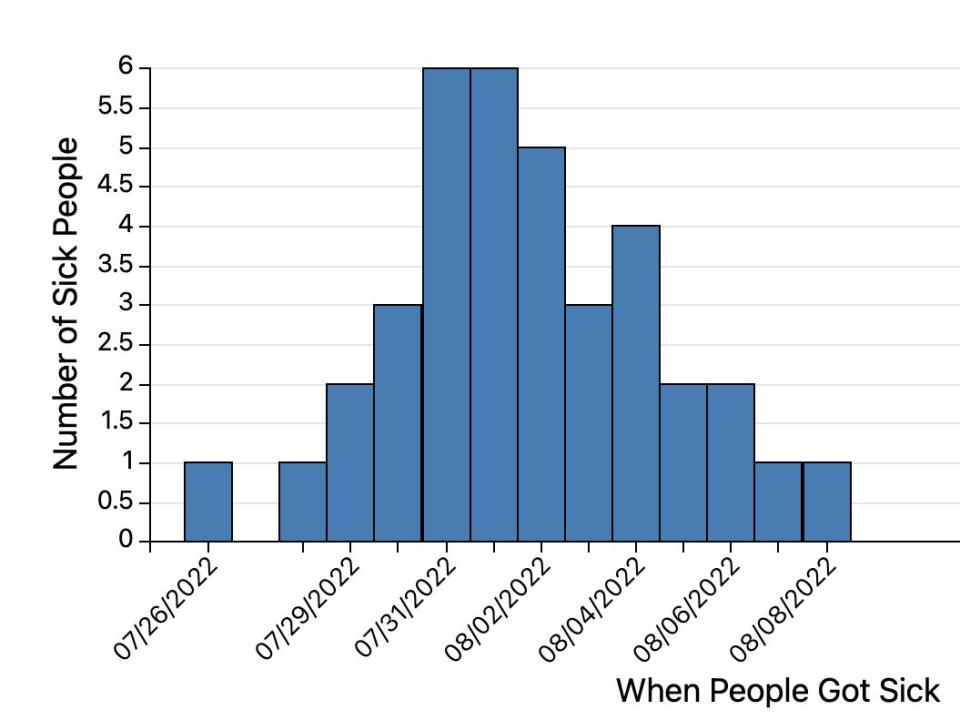CDC investigating Wendy's food amid E. coli outbreak that's left 8 people with kidney failure

At least 84 people have gotten sick with E. coli in Ohio and Michigan, according to the CDC.
The true case count may be closer to 100, based on reports from local health departments.
Past E. coli outbreaks involving the same strain have been linked to leafy greens.
Many of the people sickened with E. coli in Ohio, Michigan, Pennsylvania, and Indiana reported eating at Wendy's restaurants within a week before becoming ill, the Centers for Disease Control and Prevention said Friday.
The CDC has counted a total of 84 sick people infected with the outbreak strain of E. coli as of Friday afternoon. At least eight people developed a type of kidney failure called hemolytic uremic syndrome.
Although health officials have not yet confirmed a specific food or restaurant as the source of this outbreak, evidence points to romaine lettuce served atop Wendy's burgers and sandwiches.
In an abundance of caution, the fast-food chain is removing the lettuce from sandwiches at locations in the affected region, the CDC reported. Wendy's uses a different type of romaine lettuce in salads.
Of the 62 patients who spoke to the CDC, 52 of them reported eating at a Wendy's restaurant in the week before their illness started. Many of them ordered burgers or sandwiches, so the lettuce included in both meals was one of the most common ingredients eaten by sick people.
At least 10 people have been hospitalized with symptoms like severe stomach cramps, diarrhea, and vomiting due to E. coli since the outbreak began on July 26. However, not everyone who experiences such symptoms from E. coli seeks medical care, and many potentially related cases are still under investigation.
According to Marler Clark, a law firm that is representing some of the people sickened in Ohio, a total of 116 cases of E. coli — 18 cases in Ohio and 98 cases in Michigan — have been reported by state and local health departments during the first two weeks of August.
The CDC initially announced the outbreak last Wednesday, and has since updated the case count and states affected. The agency has confirmed 23 cases in Ohio, 53 cases in Michigan, two in Pennsylvania, and six in Indiana are linked in the outbreak.
Leafy greens are commonly to blame in E. coli outbreaks
Before health officials suggested a possible source of the outbreak, food poisoning lawyer Bill Marler told Insider that fresh fruit or vegetables were likely to be involved,
Leafy greens like spinach and romaine lettuce are common carriers of E. coli because they are grown outside and often eaten raw, Marler said. Cooking food helps kill off germs that can make you sick, so fresh produce is more likely to cause an outbreak nowadays compared to something like hamburger meat.
"Not to besmirch leafy greens, but that would be the most likely culprit," Marler said. "Given the short time frame for these illnesses, it's most likely a perishable item."

If a food item with a longer shelf life were to blame, people would have gotten sick over a longer period of time, he added. Fresh greens only last a week or two before going bad, which would line up with people consuming contaminated food and falling ill between July 26 and August 6.
Additionally, the E. coli strain O157:H7 has been identified in recent cases as well as past outbreaks involving leafy greens. In August and September 2006, a total of 199 people got sick and 3 people died due to infection with that same strain, which was later linked to raw spinach.
The CDC reported two smaller E. coli outbreaks involving the O157:H7 strain in 2021. One was linked to baby spinach, while the other led back to packaged salads.
The investigation is ongoing
The true number of E. coli cases related to the outbreak is likely higher than the number reported, as it takes 3 to 4 weeks to determine if a sick person is part of an outbreak, the CDC said in an investigation notice. Noted cases have affected people of all ages, ranging from 6 to 91 years old.
"While reports of E. coli illness typically increase during the warmer summer months, this significant jump in cases is alarming," Dr. Natasha Bagdasarian, chief medical executive for the Michigan Department of Health and Human Services, said in a news release Tuesday.
The CDC is not advising that people avoid eating at Wendy's restaurants or that people stop eating romaine lettuce at this time.
To avoid getting sick with E. coli, health officials recommend rinsing fresh fruit and vegetables before eating or preparing them, and washing hands and utensils with soap and water to kill germs before and after cooking. Make sure to separate raw meat and eggs from ready-to-eat foods, and cook raw foods to the correct temperature to reduce your risk of foodborne illness.
Read the original article on Insider

